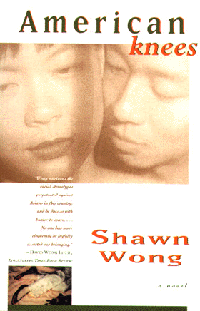GOLDSEA | ASIAN BOOKVIEW | FICTION
American Kneesby Shawn Wong
Simon & Schuster, New York, 1995, 240 pp, $11 (paperback)
A Chinese American man suffers divorce and the uncertainties of single life
EXCERPT
 ou won't even be Chinese after your wife's attorney gets through with you, Raymond." Sylvia Beacon-Yamaki said, flipping the pages of Darleen's proposed divorce settlement. Raymond wondered if someone could be a lapsed Chinese, in the same way people become lapsed Catholics. If Darleen took away her family from him and he ceased having the opportunity to be the dutiful Chinese son, would that make him a lapsed Chinese? Raymond made a mental note to ask his Jewish friend, Sam, who was one of those legendary good-boy Jewish sons and who had recently divorced a dark-haired Jewish woman to marry a blond Catholic woman.
ou won't even be Chinese after your wife's attorney gets through with you, Raymond." Sylvia Beacon-Yamaki said, flipping the pages of Darleen's proposed divorce settlement. Raymond wondered if someone could be a lapsed Chinese, in the same way people become lapsed Catholics. If Darleen took away her family from him and he ceased having the opportunity to be the dutiful Chinese son, would that make him a lapsed Chinese? Raymond made a mental note to ask his Jewish friend, Sam, who was one of those legendary good-boy Jewish sons and who had recently divorced a dark-haired Jewish woman to marry a blond Catholic woman.
What good was a good Chinese son without a Chinese family in which to practice his legendary Chinese filial duty? What would Raymond do--go around telling people, "Hi, my name is Raymond Ding. I used to be Chinese, but my wife got custody of my ethnicity"? Raymond wondered if this was cultural diversity at its worst.
Raymond Ding's Chinese name translated into English was like all Chinese boys' names were supposed to be--something grandiose and epic, like the name given to a hole-in-the-wall Chinese greasy spoon nestled at a crowded intersection, with chipped Formica tables and unmatched duct-taped Naugahyde chairs. New Golden Gardens. Golden River Palace. Riverside Palace Inn. Chinese restaurants are not called "Bob's Place." Name and fortune are related. Raymond's name told a tale of a brave warrior, truthful and loyal to his fellow warriors and the gods, a strong foundation, a fortress shining light, majestic mountain peaks, a fast car with a 7/70 warranty and a lifetime Die Hard battery. The truthful, loyal, and brave one would marry, and his wife would bear him male children so that his name would be passed on to the next generation. We are immortal, the family name implied. Actually, Raymond didn't know what his Chinese name was, the name his grandmother had called him in a language he forgot a year after he started public school.

Perhaps not being Chinese was an option in America. Certainly it was easy enough to change your mind and decide to be some other Asian ethnicity, such as Japanese, Korean, Vietnamese, Thai, Cambodian, Malaysian, or even a different kind of Chinese, such as Taiwanese. What non-Asian would know? Or Raymond could even be Chinese from Little Rock, Arkansas, where folks would refer to him as "Say, Ray--Ray Bob Daing." and his accent would mark him unmistakeably as American. He had once met a Korean immigrant who had learned English in North Carolina. Her talk was, for the the most part, perfect English--some confusion with r's and l's, an occasional h thrown in behind an a, and a wandering accent on polysyllabic words that made her sound like Nancy Kwan in The World of Suzie Wong, with Richard Petty as her English teacher. But when she drawled, people knew she was an American. When Raymond spoke, with no accent, they just noticed that he spoke pretty good English. In the schoolyard, kids used to taunt him. "What are you--Chinese, Japanese or American Knees?" they'd chant, slanting the corners of their eyes up and down, displaying a bucktoothed smile, and pointing at their knees. When Raymond, not liking any of the choices, didn't answer, they'd say, "Then you must be dirty knees."
ASIAN AIR ISSUES FORUM |
CONTACT US
© 1999-2003 GoldSea
No part of the contents of this site may be reproduced without prior written permission.
